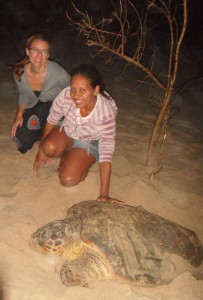
Marisa Rinkus, 2010-2011, Brazil (left), and her research assistant inspect a sea turtle on the Brazilian coast
In February 2011, I left a snowy Michigan winter and headed south into the warm Brazilian summer to study community engagement and sea turtle conservation on my Fulbright U.S. Student Program grant. While excited by the prospect of living near the beach, I knew that conducting research in another country would require hard work with the assistance and collaboration of others.
In reality, relationship building on a Fulbright grant begins before you leave the United States–often via email and Skype. Having already made a few contacts in Brazil by email, and even visiting a few months before my Fulbright application was due, I assumed securing an in-country affiliation would be easy. However, my request for a formal letter was denied at the last minute. With little time to spare, I turned to the Internet and stumbled upon the graduate program in Society and Environment at the Universidade Estadual de Campinas which mirrored my research interests—community participation in coastal conservation. With a little bit of convincing, a translated copy of my proposal, and a draft letter of affiliation outlining the terms of our collaboration (which included a joint publication), I soon had my Fulbright affiliation. Once I arrived in Brazil, my host-country adviser provided feedback on my research and helped me navigate the paperwork required to conduct research as a foreign researcher in Brazil, including securing research ethics approval for conducting research with human subjects (similar to Institutional Review Board approval in the United States).
The people I spent the most time with during my grant were at my research site on the northern coast of Bahia, Brazil. Biologists and staff at Projeto TAMAR, the Brazilian national sea turtle conservation project, were extremely hospitable. For example, when I started, they helped me find a place to live. They also gave me access to documents, opportunities to observe their work, and transportation to neighboring communities to collect data. In exchange, I taught conversational English to staff, volunteered at educational events at local schools, and agreed to share my findings and all future publications. It’s important to remember that your relationship with your host country is reciprocal—you must put some thought into what you plan to contribute as much as you expect to learn during your grant.
To assist in data collection, I hired and trained three local research assistants. They helped me learn the local culture—what time of day it was appropriate to visit people in their homes, along with what was acceptable to ask, say and do. I am forever grateful for all of their hard work and patience with all of my “rules” about ensuring proper research ethics and avoiding bias in selecting research participants. While my Fulbright research would not have been possible without the assistance and guidance of many people, what I miss most is the camaraderie. I will always have fond memories of last minute churrascos (barbeques), hanging out in the praça (town square) and good conversation.
Since my interests lie in increasing community engagement in conservation programs, I was excited to share my findings at the conclusion of my time in Brazil with staff at TAMAR and other community leaders. The most rewarding aspect, however, was being able to connect TAMAR with other community organizations, such as a local artisan group. Today, I am able to watch these relationships blossom via social media and witness how engagement in conservation can bring people together.
Although overall community participation is low, my Fulbright research study suggests that people who participate in non-conservation related activities (church groups, fisher’s association, artisan groups, etc.) are more likely to participate in conservation efforts in the future, if support for collaboration between conservation programs and community groups is available.
From sharing my research with Brazilian university professors, students, conservation managers, and local residents, to forging new friendships, my time as a Fulbright U.S. Student was an experience that has made my world just a little bit smaller and my horizons a little bit broader.
Have questions for Marisa? She can be contacted as a Fulbright Alumni Ambassador at MRinkus.AlumniAmbassador@fulbrightmail.org.

No Comments